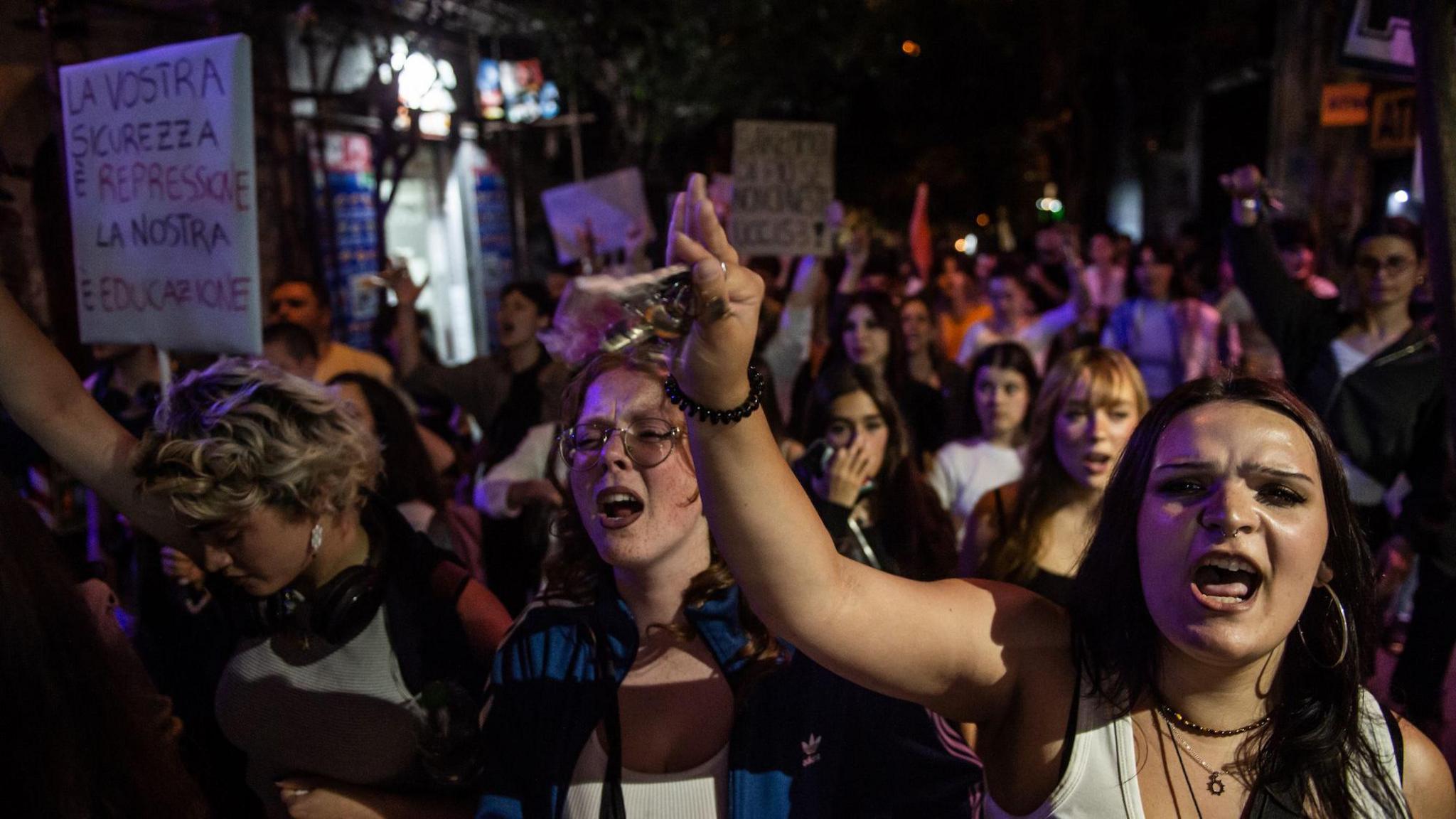Italian parliament unanimously votes to make femicide a crime

A Naples protest following the death of fourteen year-old Martina Carbonaro who was killed by her ex-boyfriend in May 2025
- Published
Deputies in the Italian parliament have voted unanimously to introduce the crime of femicide – the murder of a woman, motivated by gender – as a distinct law to be punished with a life sentence.
In a symbolic move, the bill was approved on the day dedicated to the elimination of violence against women worldwide.
The idea of a law on femicide had been discussed in Italy before but the murder of Giulia Cecchettin by her ex-boyfriend was a tragedy that shocked the country into action.
In late November 2022, the 22-year-old was stabbed to death by Filippo Turetta, who then wrapped her body in bags and dumped it by a lakeside.

Thousands gathered outside the church where Giulia Cecchettin's funeral was held to pay their respects
The killing was headline news until he was caught, but it was the powerful response of Giulia's sister, Elena, that has endured.
The murderer was not a monster, she said, but the "healthy son" of a deeply patriarchal society. They were words that brought crowds out across Italy demanding change.
Two years on, MPs have voted for a law on femicide after a long and passionately debated session of parliament. It makes Italy one of very few places to categorise femicide as a distinct crime.
Introduced by Prime Minister Giorgia Meloni, the law was backed by her own hard-right government, as well as opposition MPs. Many wore red ribbons or red jackets today to remember the victims of violence.
From now on, Italy will record every murder of a woman that is motivated by her gender as femicide.
"Femicides will be classified, they will be studied in their real context, they will exist," Judge Paola di Nicola, one of the authors of the new law, said of its significance.
She was part of an expert commission that examined 211 recent murders of women for common characteristics, then drafted the femicide law.
"Talking of such crimes as rooted in exasperated love or strong jealousy is a distortion – that uses romantic, culturally acceptable terms," the judge argues, surrounded by her research at her home in Rome.
"This law means we will be the first in Europe to reveal the real motivation of the perpetrators, which is hierarchy and power."
Italy will now join Cyprus, Malta and Croatia as EU member states, external that have introduced a legal definition of femicide in their criminal codes.

Judge Paola di Nicola helped draft the new law on femicide, the first of its kind in Europe
There is no agreed worldwide definition of femicide, which makes it hard to count and compare statistics.
The Italian law will apply to murders which are "an act of hatred, discrimination, domination, control, or subjugation of a woman as a woman", or that occur when she breaks off a relationship or to "limit her individual freedoms."
The latest police data in Italy shows a slight fall in the number of women killed last year to 116, with 106 said to be motivated by gender. In future, such cases would be recorded separately and trigger an automatic life sentence, meant as a deterrent.
Gino Cecchettin isn't sure such a law would have saved his daughter: her killer was sent to prison for life in any case.
But he does think defining and discussing the problem is important.
"Before, many people especially from the centre and extreme right didn't want to hear the word femicide," Mr Cecchettin told the BBC. "Now this is a world where we can speak about it. That's a little step, but it's a step."
His own focus is on education, not legislation.
After Giulia's murder, her father describes taking "a very intense look into what was happening around me" then deciding to create a foundation in her name devoted to preventing others suffering as his family have.
"I wanted to understand what had come to [Filippo's] mind," Gino Cecchettin explained. "He was a student, a beloved son. Like a normal guy."
What he found, he says, was a society full of stereotypes about women and notions of male superiority, and young men struggling to manage their emotions.
His daughter's ex-boyfriend had stabbed her to death in a premeditated attack, when she refused to get back together with him.

Protests against violence against women have taken place across Italy recently, often led by feminist group Non Una Di Meno (Not One Less)
Mr Cecchettin now tours Italian schools and universities to talk to young people about Giulia and about respect.
"If we give them the right tools to handle their life they will not act as Filippo, they will probably act in a different manner. They will not stick to the model of the Superman, or the Macho Man," is his hope.
But getting those 'tools' into schools – in the form of a mandatory course of emotional and sexual education – has not been easy. Far-right MPs have resisted all but optional sex education classes for older children. The Cecchettin Foundation wants them to be obligatory and start early, when young people get access to the internet.
The femicide law itself has its critics.
When the bill was first presented earlier this year, one group called it a "poisoned meatball".
"There is no lack of protection, no legal gap to fill," is how law professor Valeria Torre of Foggia University puts it.
She believes the new definition of femicide is too vague and will prove difficult for judges to implement.
Also, as most women killed in Italy are murdered by current or former partners, proving that the motive is gender will be challenging.
"I am afraid that the government just wants to persuade people it's doing something for the problem," she told the BBC. "What we really need is more economic effort for this problem…to overcome the problems of inequality in Italy."
Even those who approve of legislating against femicide agree that it must come with far broader measures against gender inequality.

Museum of the Patriarchy has a temporary exhibit imagining a day when the patriarchy has ended
Italy's problems on that front are currently on display at the Museum of the Patriarchy, a thought-provoking new exhibition in Rome.
Italy currently ranks 85th in the Global Gender Gap Index, almost the lowest of all EU states, with just over half all women in employment, to name just one issue.
"For us, the way to fight against violence against women is to prevent the violence, and to prevent the violence we have to build equality," argues Fabiana Costantino of Action Aid Italy, which created the temporary museum to imagine a day when male dominance is consigned to the past.
Exhibits include a loudspeaker playing cat calls and a room with the names of women killed by man projected onto a wall.
"There are a lot of forms of violence - like a pyramid," Fabiana Costantino says. "We have to destroy the base in order to destroy the problem in its worst form, which is femicide."
Tuesday's mammoth session of parliament ended late in the evening in Rome with a final speech by a governing party MP vowing that violence against women "will not be tolerated, will not go unpunished."
The law was approved by all 237 deputies and greeted with a burst of applause.
"This shows that on the fight against violence against women, our country has a common political will," Judge Paola di Nicola argues, whilst accepting there's a long way still to go.
"It shows that Italy is finally speaking about violence against women having deep roots. The first effect is to make the country discuss something it's never confronted before."
Additional reporting from Giulia Tommasi
Related topics
- Published3 December 2024

- Published24 November 2023
